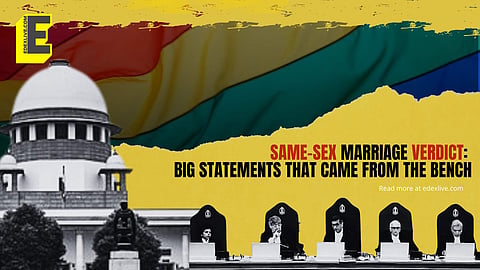

In a landmark verdict, the Chief Justice of India (CJI) DY Chandrachud, along with a five-judge bench, delivered a decisive judgment on same-sex marriage, leading to no immediate changes in the Special Marriage Act.
Nonetheless, the court recognised live-in relationships, including those of queer couples. CJI DY Chandrachud emphasised the importance of not encroaching on the legislative domain, leaving the task of enacting laws on marriage to the Parliament and State legislature. However, he stressed that the concept of marriage is not static, asserting that queer individuals have an equal right to form a "union."
Key points from the judgments include:
CJI : Gender of a person is not the same as their sexuality.
CJI : To imagine that queer people exist only in urban and elite spaces is to erase them.
CJI: Queer is a natural phenomenon known to India for ages; It is neither urban nor elitist.
Justice Kaul: Same-sex relationships have been recognized from antiquity, not just for sexual activities but as relationships for emotional fulfilment.
CJI: Adoption regulations are violative of Article 15, discriminatory to queer community.
The court criticised adoption regulations for discriminating against the queer community
CJI: Marriage alone does not give stability to a household.
CJI: Unmarried couples, including queer couples, can jointly adopt a child.
CJI: It cannot be assumed that unmarried couples are not serious about their relationship.
CJI: The law cannot assume that only heterosexual couples can be good parents as it would amount to discrimination against queer couples.
CJI: The committee shall consider the following — including queer couples as family in ration cards, enabling queer couples to nominate for joint bank account, rights flowing from pension, gratuity etc.
CJI: Transgender persons in heterosexual relationships have the right to marry under the existing laws including personal laws.
CJI: Material benefits/services given to heterosexual couples & denied to queer couples will be a violation of their fundamental rights
Justice Kaul: I wholeheartedly agree with the Chief Justice of India that there is a need for an anti-discrimination law.
Justice Kaul: Legal recognition of non-heterosexual unions is a step towards marriage equality. Non-heterosexual unions are entitled to protection under the Constitution. Non-heterosexual and heterosexual unions must be seen as both sides of the same coin.
CJI: The ability to choose one’s life partner goes to the root of the right to life and liberty as defined in Article 21.
Justice Bhat: We do not particularly subscribe to the views of CJI on democratising intimate spaces…these outcomes were brought by legislative acts.
Justice Bhat: Queer persons have the right to choose partners, State cannot be obligated to recognise rights flowing from such union.
Justice Bhat: Marriage is a social institution. The marital status is not conferred by the state. The idea of marriage is not a fundamental right.
Justice Bhat: A citizen cannot seek the construction of a network of roads to enforce the right to travel.
